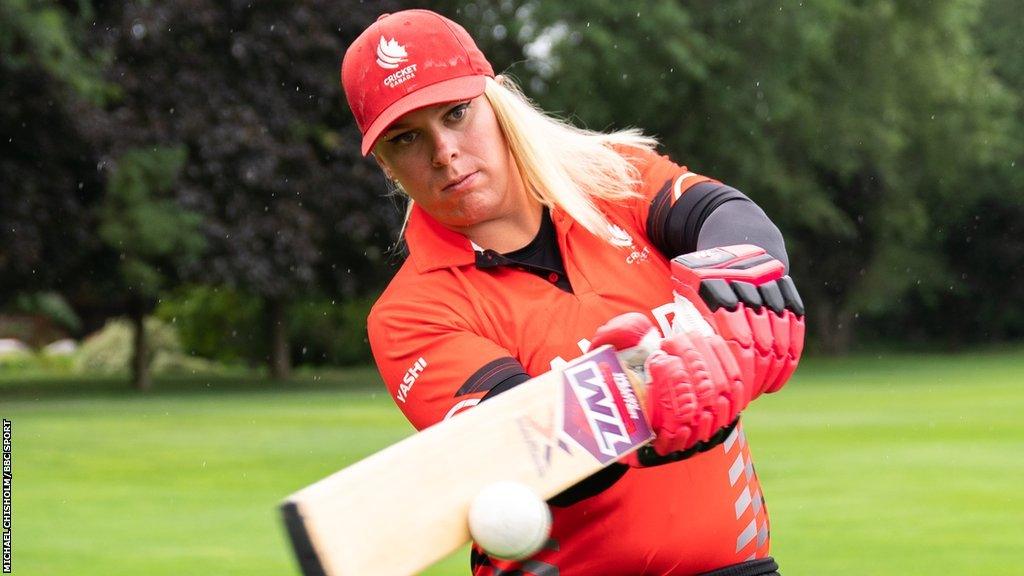Transgender women banned from playing international women's cricket by ICC
- Published

Canada's Danielle McGahey was the first transgender cricketer to play an international match
Transgender women have been barred from playing in international women's matches under new regulations from the International Cricket Council.
Any player who has gone through male puberty will not be eligible for women's internationals regardless of any surgery or treatment undertaken.
In September, Canada's Danielle McGahey became the first transgender cricketer to play an official international game.
The new regulations will be reviewed within two years, the ICC said.
Following a nine-month consultation process, the governing body said its new policy, which takes effect immediately, was based on "protection of the integrity of the women's game, safety, fairness and inclusion".
"The changes to the gender eligibility regulations resulted from an extensive consultation process and is founded in science and aligned with the core principles developed during the review," said ICC chief executive Geoff Allardice.
"Inclusivity is incredibly important to us as a sport, but our priority was to protect the integrity of the international women's game and the safety of players."
McGahey played six T20 internationals at an ICC T20 World Cup qualifying tournament in Los Angeles, where she made 118 runs in six innings at an average of 19.66.
Her top score was a 45-ball 48 against Brazil.
She received the news of her ban from a lawyer at the ICC on 14 November and expressed her disappointment at the decision following the announcement.
McGahey told BBC Sport: "I have now read the new policy but I was informed by the ICC last week and they let me know what was about to occur. So I've been kept in the loop at all points.
"I don't have a lot to say currently but it's a tough decision to take. Obviously, processing it has been challenging as it marks the end of my international cricket career.
"It's obviously incredibly disappointing when I consider the implication it will have on young transgender women all across the world.
"I hope it does not dissuade anyone from chasing their dreams. Trans women belong in sport, and belong in cricket."
The ICC's decision to ban McGahey and other transgender women cricketers from the women's game has been applauded by the Women's Rights Network (WRN).
"This is a significant decision and we welcome it but we question why it has taken so long," WRN spokeswoman Jane Sullivan said.
"It is vital to point out that this does not mean men who identify as trans are banned from cricket altogether. They are still free to play in men's or even mixed teams."
Gender eligibility in domestic cricket will remain a matter for individual boards.
Currently, under guidance from the England and Wales Cricket Board (ECB), all trans women looking to take part in elite level female-only competitions must apply for written clearance. Evidence is then reviewed on a case-by-case basis.
An ECB spokesperson said: "We continue to review our transgender policy, considering inclusivity, safety and fairness, and will consider these new ICC regulations as part of this work."
Other sports
In June 2022, swimming's world governing body Fina voted to stop transgender athletes from competing in women's elite races if they had gone through any part of the process of male puberty.
Former Great Britain swimmer Sharron Davies, who has argued against transgender participation in women's elite swimming, told BBC Sport she was "really proud of Fina".
However, Olympic diving champion Tom Daley said he was "furious" at the decision.
In July 2022, the Rugby Football League and Rugby Football Union banned transgender women from competing in female-only forms of their games.
And in July 2023, world cycling's governing body, the UCI, ruled transgender women would be prevented from competing in female events.